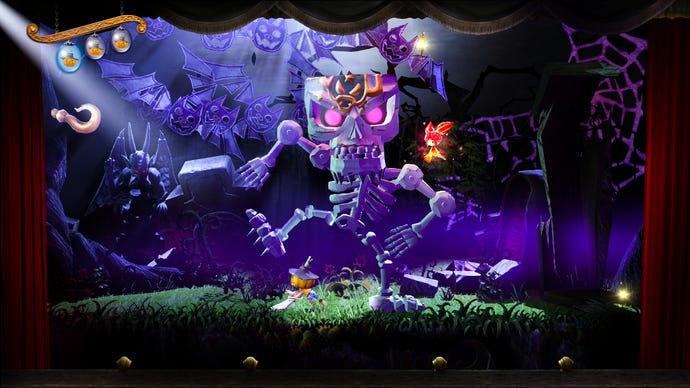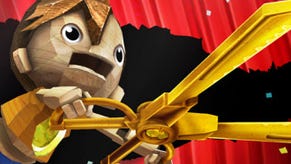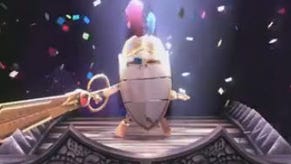The Story Behind Japan Studio's Most Personal Project
Eurogamer's Martin Robinson takes a look inside the family theater of Puppeteer.
This article first appeared on USgamer, a partner publication of VG247. Some content, such as this article, has been migrated to VG247 for posterity after USgamer's closure - but it has not been edited or further vetted by the VG247 team.
Sony has earned a reputation for its brilliant follies. Where else would you go to find a semi-interactive miserablist murder mystery like Heavy Rain, or a copulating carnivore simulator like Tokyo Jungle?
Even in such esoteric company though, Puppeteer stands out as something truly daring: a side-scrolling platformer with a sizeable budget and a price-tag to match. It's an attempt to revive on a grand stage a genre that's only been kept alive this past generation in the hands of Nintendo and a scattering of indies. Who could this game possibly be for?
It turns out that Puppeteer has been created for a very particular audience.
"I'm playing games with my son, I'm in my house in Tokyo, we're playing this two-player game - I'm not going to say what it was - and he just gets up and walks out," Japan Studio's Gavin Moore, a British ex-pat who's been working out of Sony's Shinagawa headquarters for coming up to a decade, explains.
"He just goes outside and plays with his friends. Part of me is going 'oh great, he's gone outside', and the other half's, well, 'I'm the creative director of a Japan Studio team, I don't think that's a good thing'. So he comes back in, and I asked what that was all about. He left me with a two-player game and I couldn't finish it, and that kind of upset me.
"And he said they're all the same. All the games we've been playing are all the same - you're doing the same things. So I asked what he wanted, and he said he wanted a game that changed every five to ten minutes. And I was like, yeah right, well I want an Aston Martin. But he said 'you make games for a living - surely you can do that?'"
A visit to one of Japan's bunraku - a traditional puppet show in Japan where high craft meets high theatrics - provided the spark for what could possibly satisfy Moore's son's tastes. "The acting is going on with the puppets, but the stages were changing as they were acting - instead of closing the curtains it was happening in front of you. That's where the lightbulb came on."
"I have faith in the title. What I don't have faith in is the imagery that people have of what it is. This is something special for me - and not because I'm making it for my son."
Gavin Moore, Japan Studio
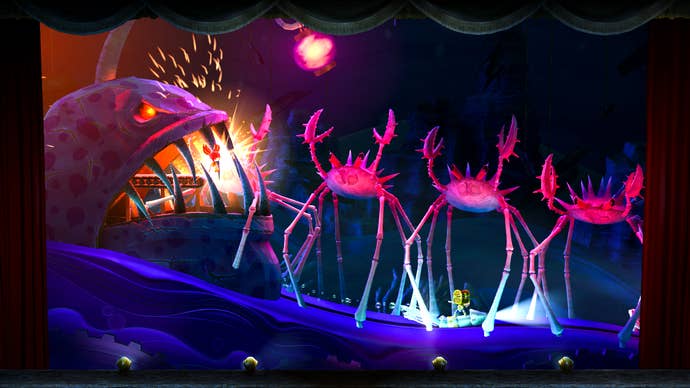
And how did Sony respond to a pitch with such a personal motive? "Well, I didn't tell them I was going to spend all this money making a game for my son. That would have been suicide straight off. I sat in a room and said I've got this game idea. I'd been working on it quite some time, there was artwork and stuff and I explained it to them. If you try and explain to anyone, they kind of glaze over - 'it's set in this magical theatre and you have magical scissors and your head falls off and that's your life' - and they're like, whatever Gavin. But we made a concept movie really quickly, and they let me go and make it."
Three years on and Puppeteer's preparing for its release, just coming for a year on from a Gamescom reveal last year that was as warm as the Kolnmesse in late summer. There's an appetite for original 2D platformers, it seems, that goes well beyond Moore's own son.
It probably helps that Puppeteer's delightfully, endlessly inventive. You play as Kutaro, a boy who's been turned into a puppet and who must work his way through over twelve hours of cascades of theatrical backdrops and ever-changing mechanics, your replaceable head opening up new ways to interact with the environment as well as an ever-present pair of scissors that help you tear through the scenery.
On top of that, Puppeteer's an astounding looking game. As the scenery spins in and out of the screen, the enemies pirouetting across it while Kutaro playfully bounces about, there's a tangible sense of a world created from wood, paper and string, and of a dozen busy hands operating behind the scenes to keep everything in motion. Unlike its stablemate LittleBigPlanet though, Puppeteer's mechanically tight, a benefactor no doubt of the developers sharp-eyed focus on making a game that doesn't dabble in the sometimes messy world of player creation. But just like Media Molecule's own effort, it's a product that you couldn't imagine coming from any other company in the world.
"I think that's very, very Sony," Moore says of his paymaster's continued backing. "Our stance at Japan Studio is we're told we should make games that nobody else has. Naughty Dog and Santa Monica, for instance, they're told to make AAA blockbuster games - but we're told to make games that no-one's seen before, different ideas that you can't get anywhere else apart from PlayStation. They're very, very supportive of that. And that's kind of cool."
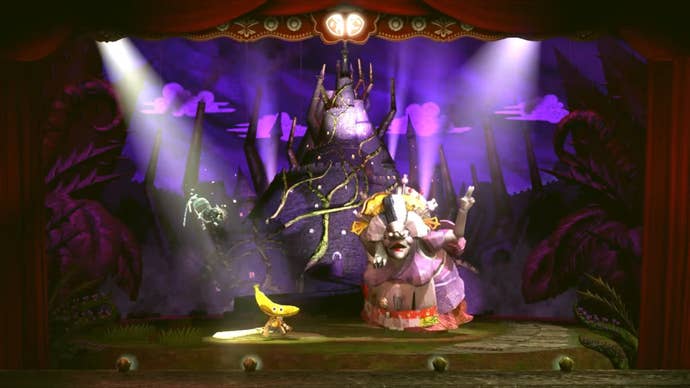
There's something else that's responsible for the unique flavour of Japan Studio games as well. "It's also down to the fact that Japanese people are really, really crazy. They're ordered to live in society in a certain way, and their imaginations go off and play on their own and they come up with these crazy ideas."
Odd then, that Puppeteer, despite its leanings on bunraku theatre, and despite a meticulous detail in its design, feels very British. There's a little bit of Monty Python in the grandiose ridiculousness of its humor, and more particularly a lot of Gilliam-esque touches in how it's all realized in such a full-blooded, big-hearted manner.
Actually, that's not so much of a surprise given how Brit Moore's put so much of himself in Puppeteer. He's had to rein some of that in, in fact - early versions had him doing all of the voice work, a considerable feat given the constant narration that excitedly babbles over everything, and it initially went down so well there was a temptation to keep the placeholder in. The professionals replacing him retain the energy, and Moore himself retains a small cameo role - and Puppeteer still often feels like an excitable parent reciting a madcap fairytale to their own child.
There are other moments where you can sense a father's touch. The co-op mode's drop-in, drop-out, and it all harks back to the genesis of Puppeteer. Anyone can come in and pick up a pad, taking charge of a floating pixie called Picarina who dances freely across the screen, slowing the progress of enemies or picking up new powers to guide Kutaro's way. There's a hint of New Super Mario Bros. U's Boost mode, though the implementation's much more hands-on.
Without the presence of an icon like Mario, though - Puppeteer's an all-new IP - there's got to be some doubt that it can reach the same sales figures Nintendo frequently enjoys with its own platformers, and the decision to not release it full-price as originally intended shows that Sony shares some of those feelings.
"It's something we had a big discussion about between America and Europe," says Moore. "We're at the end of the PlayStation 3, and the perceived imagery for a platform game is as a PSN title - which is completely insane, as far as I'm concerned. There's the amount of gameplay we have in this, and what you're going to see in the production values we have. But we talked about it, and then we talked about the economy too. It's difficult for people to justify $60 or £40 for a title. And we want people to play it, and see how much fun it is. So we decided we'd offer it at that price, which has actually gone down really, really well - and I was surprised, because I thought people would think it was a budget title."
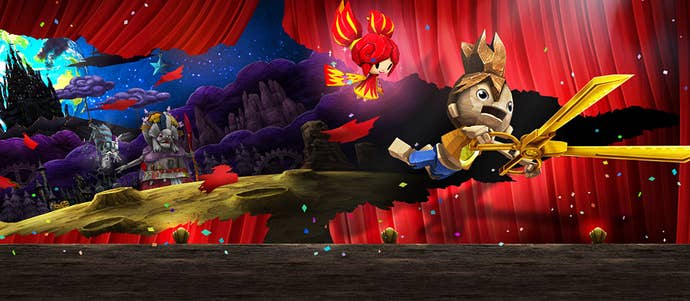
Moore's understandably a little more confident in Puppeteer's prospects, even if that is tempered with some caution - let's not forget that his game launches a mere week before Grand Theft Auto 5. In that climate, can it really do well?
"We're going to find out, aren't we? I have faith in the title. What I don't have faith in is the imagery that people have of what it is. This is something special for me - and not because I'm making it for my son. It's challenging as a one-player game, it's a lot of fun and it's jammed full of loads of stuff. I have faith, I just don't know if people are willing to take that risk. I hope they are. I want them to."
Going from early impressions, from the craft, creativity and imagination that's been poured into it, Puppeteer deserves to find a big audience. And if it doesn't, there's at least one person who'll appreciate what the team within Japan Studio has achieved. Moore's son is credited as lead game tester as well as its inspiration, and having played the game at length he's yet to walk away from it.
"It's funny," Moore smiles. "He thinks it's his game. The other day he asked if it's out yet - and then said 'where are my royalties?'"
